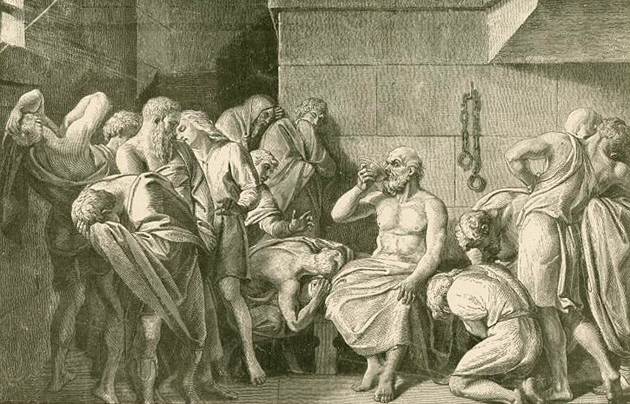T
he recent brouhaha over a spread in Vice magazine featuring artistic representations of women writers who took their own lives has me thinking about suicide. For years, growing up, I was obsessed with the thought; among my earliest memories is the desire, at age three or four, to run in front of an oncoming bus. Not because I wanted to see what would happen, but because I was sure I knew what would happen: I wouldn’t have to live any longer. I suspect there may be a suicide gene. My elder brother reports of wanting to kill himself from a very early age, and of having had to battle with the desire many times in his life. We know that suicide often “runs in the family”; three of Ludwig Wittgenstein’s four brothers killed themselves, and Wittgenstein at various points contemplated doing so — this despite his family’s enormous wealth and intelligence and its privileged position in Viennese society.
We tend to talk about suicide most when a famous person kills himself. There was, we all remember, the flurry of argument about suicide — much of it indignant, even outraged — when David Foster Wallace took his own life. His friends were deeply hurt, and many of them were writers, so they wrote about it. “[E]very suicide’s an asshole,” wrote Mary Karr, in a poem about Wallace’s death. “There is a good reason I am not/ God, for I would cruelly smite the self-smitten.” Suicide, seen as among the most selfish of acts, pushes a button in us that even murder doesn’t.
That self-destruction should be morally blameworthy because of its selfishness is, if not paradoxical, at least a bit odd. After all, if there is one thing I am entitled to as a human being, only one right I am permitted, it ought to be the right to life: this right, it has often been argued, is a kind of necessary precondition for any other right one might claim. But does it make sense to say that I have the right to life if I don’t have the right to end it when and as I choose?
Albert Camus suggested that the only serious philosophical question is whether or not one ought to kill oneself. Suicide, he wrote,
is merely confessing that [life] “is not worth the trouble.” Living, naturally, is never easy. You continue making the gestures commanded by existence for many reasons, the first of which is habit. Dying voluntarily implies that you have recognized, even instinctively, the ridiculous character of that habit, the absence of any profound reason for living, the insane character of that daily agitation, and the uselessness of suffering.
Camus’s conclusion — that the very meaninglessness of life ought to provoke us into a kind of mulish defiance toward the rationality of death — is not entirely satisfying. At one level I agree: to go on living is to say “Fuck you” to a universe that doesn’t give a damn about us. When Camus writes that we “must imagine Sisyphus happy,” we know that the greatest part of Sisyphus’ happiness must derive from the knowledge that the very gods who condemned him are now watching him, with frustration and grudging respect, push that damn boulder up the mountainside again and again. They can’t break him. But if the universe doesn’t know I’m telling it to screw itself, and if I’m still stuck here suffering, Camus’s solution turns me into the irritable French waiter who refuses to quit his job merely because he dislikes his customers so much. The customers don’t know why he’s grumpy (if they notice him at all), so whom is he really punishing?
Arthur Schopenhauer observed that it is only in the Judeo-Christian tradition that we find the wholesale condemnation of suicide, despite the fact that neither the Old nor the New Testament contains much mention of it. But Schopenhauer’s radius is a little too small: Buddhism and Hinduism also warn against the dangers and irrationality of suicide, depending on its motivations (in many Buddhist and Hindu accounts, taking one’s life to escape suffering only increases suffering in the next life). For Schopenhauer, suicide can be a perfectly reasonable choice (if you are indeed miserable, why prolong the misery?) or even a morally praiseworthy act. What courage it must require, he writes, to end one’s own life when one can see nothing better to do with it. Or when, as was sometimes true in ancient China and at the height of the Roman Empire, the shame of defeat could be so great that to go on living was an affront to oneself and one’s peers. Schopenhauer quotes Stobaeus:
The good man should flee life when his misfortunes become too great. . . . So he will marry and beget children and take part in the affairs of the State, and, generally, practice virtue and continue to live; and then, again, if need be, and at any time necessity compels him, he will depart to his place of refuge in the tomb.
Shakespeare’s suicides die for honor or love. And as the self-immolations of Buddhist monks during the Vietnam War and in Tibet today remind us, suicide may be a profoundly morally praiseworthy thing. To take one’s life in protest of human injustice seems far more rational than to go on living in protest of the injustice of the universe.
We may feel that the suicide is failing in some debt he or she has to society. But as Hume puts it in his essay on the subject,
[S]uppose that it is no longer in my power to promote the interest of the public; suppose that I am a burden to it; suppose that my life hinders some person from being much more useful to the public: in such cases, my resignation of life must not only be innocent, but laudable. And most people who lie under any temptation to abandon existence are in some such situation; those who have health, or power, or authority, have commonly better reason to be in humour with the world.
It’s unlikely, as Hume points out, that a person who feels satisfied with his lot will wish to take his own life; much more common is the suicide who — mistakenly or no — sees himself as useless, even harmful, to the people and world around him. In perhaps the most famous defense of suicide ever offered, Hume writes: “I believe that no man ever threw away life while it was worth keeping.”
I
am not endorsing suicide. Hume is wrong: many people have thrown away or tried to throw away lives well worth keeping (the Wittgensteins are a good example). My elder stepbrother Paul leaped from one of the tallest buildings in Calgary when I was seven years old, and I wish he were still around. I have tried it, and, happily, I have failed. A few months ago I was in the mountains of southern Brazil with a Tibetan Buddhist monk, a retired firefighter, who told me (we were swapping stories of how we became Buddhists) that he had tried three times to kill himself. I admitted my own attempts. “We’re in the most shameful club of all,” he said. “We are the ones who couldn’t even do that.” It’s true: people are furious with you if you succeed and contemptuous of you if you fail.
“But your wife, your parents, your children!” we want to remind the would-be suicide. Here’s the darkest paradox of that dark night of the soul: it is precisely the suicide’s willingness to sacrifice his family’s happiness that serves, in his mind, as further evidence that he’s the kind of person who, in the long run, will only harm the people he loves by sticking around. This sounds like the most contemptible form of self-pity. But we can’t reproach the suicidally depressed for feeling too sorry for themselves: that is symptomatic of a mind no longer able to bear its own existence. “Yes, I feel too sorry for myself,” the suicide will happily admit, “so sorry for myself that I can’t take it anymore.” You can drown in self-pity, but knowing that self-pity is morally blameworthy doesn’t make things better, it makes them worse.
What is to be done? I began this little inquiry by mentioning the silly, self-righteous complaints people have been making about Vice’s photo essay depicting artist-suicides. “Exploitation!” “Sensationalism!” It’s an unfortunate, hypocritical fuss in a culture that both glamorizes the act and expresses moral outrage over it. (If you want to see some sensible comments about the shoot, look at what Joyce Carol Oates has to say, here.) Being unable to talk about suicide openly, even when a fashion spread in a popular magazine is what provokes the conversation, is genuinely damaging. I was dismayed when Vice’s editors decided to take the photos off their website, because they had initiated a lively and mostly interesting (if not always well informed) discussion.
I remember when, at about age fifteen, I finally mustered the courage to tell my father about my desire to kill myself. I could talk to him about anything: he was one of those New Agey crying dads who erred on the side of embarrassing his kids by speaking his mind. But when I brought up suicide, he replied, “Son, don’t even say those words.” I have three daughters, and I now understand how he must have felt. But I still believe open discussion is critical. Suicide is on the rise in America: more Americans die by suicide than in car accidents, and suicide by gun is almost twice as common as homicide by gun. (It’s hard to know how to feel about that last statistic.) Middle-aged men in America are committing suicide at an accelerating rate. When I was in treatment for depression, I found that meeting and talking to other people about suicide was profoundly helpful; I saw what a loss it would have been had those people succeeded.
A friend once said to me, “Suicide leaves behind nothing but miserable people blaming themselves.” My psychiatrist, a wise eighty-seven-year-old woman who has been practicing six days a week for more than forty years, told me, “Think of the example it sets. For your children.” That remains the most compelling argument I’ve heard against suicide: it sets an example — for one’s children, of course, but for others too. It isn’t that we want people to “tough it out.” It isn’t that we think the suicide has acted out of moral weakness. It’s that, when we look at the people we knew who committed suicide, they were often the very people we most appreciated having around. We need more of those people, not fewer. The bad weather of depression can and does change. The argument for awaiting such a change presupposes that life is worth living for its own sake, which I think is the deeper point Camus was trying to make. As far as we know, life is the only game in town.






